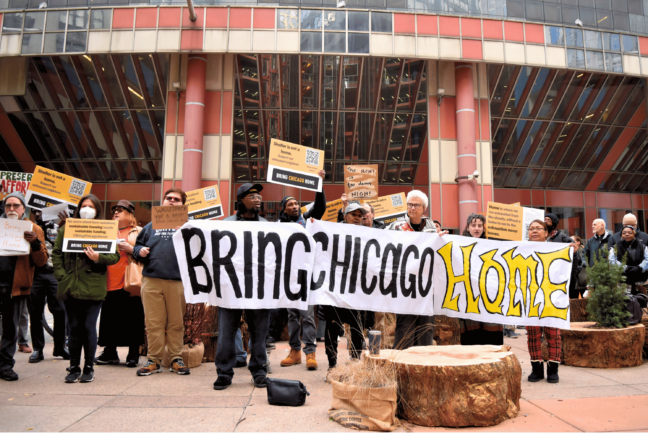By Sam Paler-Ponce
November 20, 2023
Chicago’s City Council greenlit the 2024 budget, allocating additional resources to respond to the city’s growing homelessness crisis. While the approved budget reveals targeted increases in critical services, much more is needed than these small increases subject to annual appropriations.
Coalition for the Homeless (CCH) estimates 68,440 Chicagoans experiencing homelessness at the beginning of 2022, the most recent data available. This reflects a 2,829-person increase from the previous year—up 4.30 percent. This estimate is inclusive of more than 44,000 Chicagoans doubling up.
While we are happy to see that some line items are growing—by about 15-percent in total, or a $7 million increase—much more is needed than these small incremental increases subject to annual appropriations. Let’s dive into the key aspects of this budget and understand where the city’s resources are allocated.
Homeless Services
The Homeless Services budget is set to receive a modest increase, rising from $17 million in FY 2023 to $21.5 million in FY 2024. These funds will support various programs assisting Chicagoans experiencing street or shelter homelessness and, in certain instances, preventing homelessness altogether. Funding can also assist with non-life-threatening situations by providing well-being checks, responding to requests for emergency shelter, and supportive services.
Homeless Services Fund
The Homeless Services Fund also sees an increase, rising from $12.4 million to $13.7 million. Revenues to the Homeless Services Fund are dedicated to services for families experiencing homelessness and housing services for chronic homelessness, funded by a four percent Hotel Tax surcharge on vacation rentals or shared housing units. Revenue from this house-share surcharge has continued to recover since pandemic lows seen through 2021. Revenues of $7.1 million along with reconciliation of prior year revenues will provide the fund with total 2024 resources of $14.9 million.
Domestic Violence Fund
The budget for the Domestic Violence Fund has increased slightly, from $10 million to $10.1 million, with contributions from a 2-percent surcharge on home shares. This fund plays a crucial role in supporting survivors of domestic violence in Chicago.
Flexible Housing Pool (Youth)
The Flexible Housing Pool for youth experiences a boost, with funding increasing from $5 million to $6 million. The vision of the Flexible Housing Pool (FHP) is to create a cross-sector investment and innovative program delivery strategy to increase supportive housing resources for Chicagoans at the intersection of homelessness, complex physical and behavioral health needs, and justice system involvement.
Related 2024 Budget Funding
The 2024 budget incorporates several notable increases, including:
- Office of New Arrivals: A new entity within the Department of Family and Support Services (DFSS) with a budget of $1.2 million. This office aims to assist new arrivals to Chicago.
- Services for New Arrivals: A substantial allocation of $150 million for supporting newcomers to the city.
- Home Repair Program: A $10 million investment to repair porches and roofs for low-income homeowners, enhancing living conditions.
- Home Modification Program: An allocation of $3.8 million to support people with disabilities in making necessary home modifications to live independently.
The 2024 Chicago city budget provides a sense of renewed commitment to addressing homelessness. With incremental increases in funding for homeless services, it’s evident that the city is taking proactive steps to make real change.
The future of funding
Though the dedicated revenue will not be available until 2026, “Bring Chicago Home” tax reform serves as a beacon of hope, generating essential revenue to fund housing solutions for Chicagoans experiencing homelessness. In a city grappling with a pressing homelessness crisis, the need for innovative solutions is undeniable— and for most residents, reforming Chicago’s real estate transfer tax is a no-brainer.
In September, the median price for Chicagoland homes surged to $339,900, a whopping 9.6% year-over-year increase. Even amid high-profile headquarter relocations, Chicago retained its position as the nation’s top metropolitan investment area for the 10th consecutive year.
Bring Chicago Home revamps Chicago’s one-time real estate transfer tax. The plan creates a tax cut for property sales below $1 million and a marginal rate increase for sales exceeding $1 million. New revenue would be legally earmarked to fund housing solutions for Chicagoans experiencing homelessness.
For the 68,440 Chicagoans experiencing homelessness, Bring Chicago Home is a no-brainer; it creates substantial, dependable funding for permanent housing with essential supportive services, following models with proven results.
In a city grappling with homelessness, Bring Chicago Home emerges as a beacon of hope and practicality, easing the financial burden of housing for most Chicagoans and funding critical resources for people experiencing homelessness.

